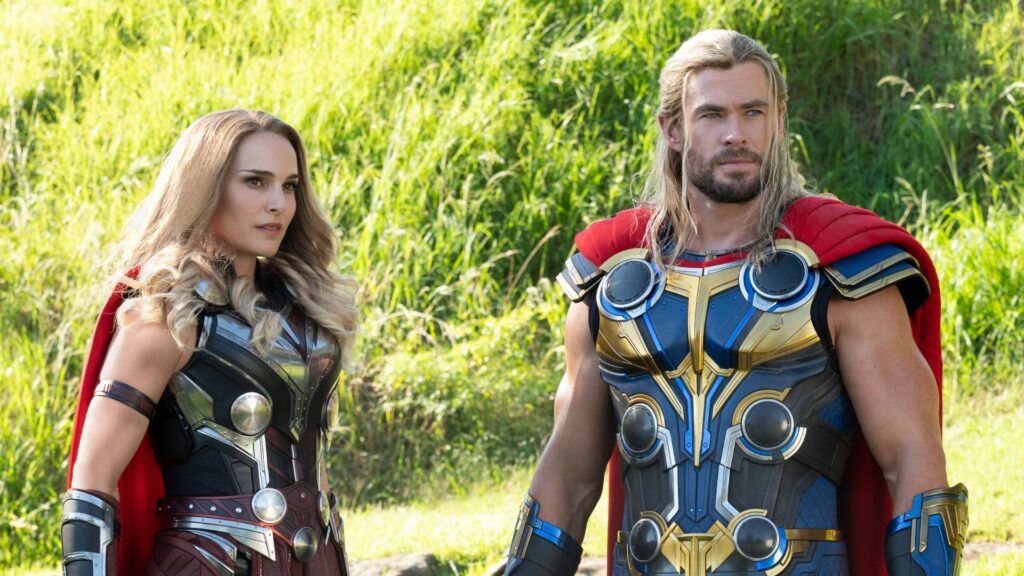
In opening narration that’s akin to the “Previously on” recap of a TV show, the blue rock-being Korg reminds viewers of Thor: Love and Thunder that Loki, the titular god’s brother, is dead; in fact, Thor has witnessed him die repeatedly. Death tends to be temporary in the Marvel Cinematic Universe—Loki’s own demise became the springboard for an ongoing streaming series—and as you watch this latest comic-book extravaganza from Taika Waititi, you may find yourself hoping for a miraculous resurrection, if only so the sly actor Tom Hiddleston might enliven the mechanized hullabaloo. You don’t get one, but the impish wit that was the god of mischief’s trademark still sometimes manages to shine through, penetrating the fog of stale plotting and monotonous fighting. Even if we’re collectively suffering from superhero fatigue (this represents the MCU’s 29th theatrical release), not everything here is old hat; for example, this is the first Marvel picture to feature a love triangle between a viking, a hammer, and an axe.
The axe, called Stormbreaker (“These weirdos all gotta have a name now”), is the jealous type; when it spies Thor (Chris Hemsworth, obviously) looking longingly at Mjölnir (the hammer, less obviously), it glides disapprovingly into frame, like a suspicious housewife who caught her husband peeking at his ex’s Instagram. Love and Thunder’s persistent insouciance can feel phony at times—a runner about the heroine workshopping a catchphrase is practically yanked from last year’s Free Guy (where Waititi had a small role)—but its smirking charm at least bears the stamp of genuine authorship. It is neither as funny nor as dynamic as its predecessor, the broadly appealing Ragnarok, but it nonetheless harnesses the same spirit of cheerful frivolity.
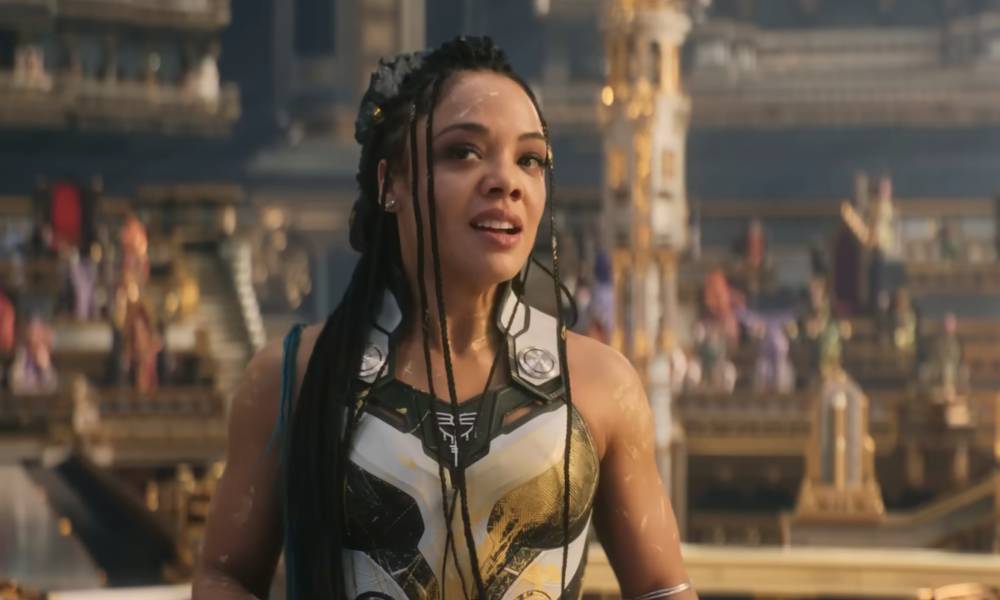
It is naturally a matter of taste, but I generally deem silliness in comic-book pictures to be a feature rather than a bug. As a piece of storytelling, Love and Thunder, which was written by Waititi and Jennifer Kaytin Robinson, is aggressively minor—a forgettable episode of rescuing, squabbling, and galaxy-trotting. The benefit of this slightness is that the film is largely unencumbered by the franchise prerogatives of the MCU; there is minimal name-dropping or stone-chasing, and even the obligatory stingers don’t tease appearances by other members of the Avengers. It sounds strange to say about a movie that visits a half-dozen planets and contemplates the death of every deity in the universe, but the scope here is relatively small—a self-contained adventure more concerned with whimsy than world-building.
In fact, when Love and Thunder opens, its mighty hero is wrestling with the specter of his own irrelevance. Unshackled from his avenging responsibilities, Thor now moonlights as a sort of voluntary mercenary, periodically joining up with the Guardians of the Galaxy for some anonymous planet-saving just so he can feel useful. (As a reward, he inherits a pair of mystical goats whose perpetual shrieking alternates between amusing and irritating.) Meaning arrives when he journeys to New Asgard, a jolly hamlet in Norway where his former compatriot, Valkyrie (Tessa Thompson), is suffering through a similar bout of existential ennui, having traded in her gleaming armor and winged horse for the less exotic garb and duties of a civil servant. Together, they and Korg (again played by Waititi) must disrupt the machinations of a celestial serial killer (more on him in a bit), at which point Thor encounters his feminine doppelganger—a beautiful and athletic woman sporting flowing blond locks, a silver helm, and that precious hammer. Oh, she’s also his old girlfriend.
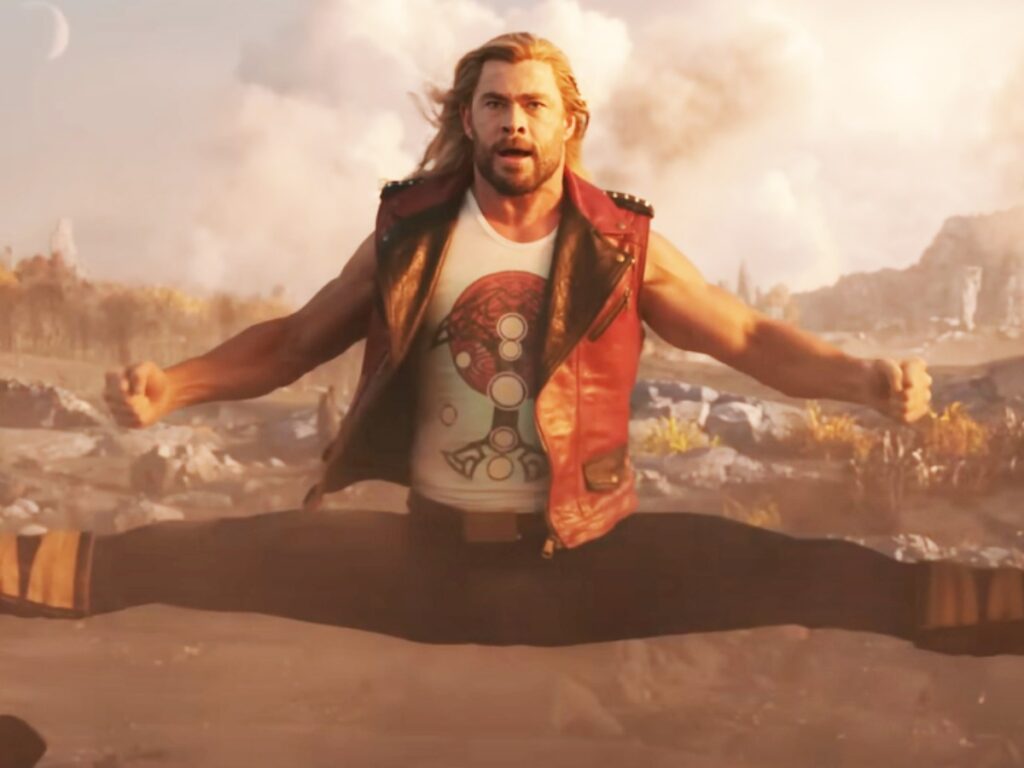
As its subtitle implies, this fourth installment in the Thor series (which sadly wasn’t called Th4r) is a love story, reuniting our golden-haired warrior with Dr. Jane Foster (Natalie Portman), the scientist who captured his heart 11 years and 25 movies ago. The plot, in which Thor and Jane team up to liberate a flock of kidnapped children, is designed to function as the scaffolding for the rekindling of their long-extinguished romance. It’s a sensible enough idea; Hemsworth and Portman make a pretty pair, and there are moments when they generate sparks of legitimate attraction. (Given the abiding sexlessness of the MCU, it’s something of a victory that the movie is even mildly horny, as when the characters openly admire the sight of Hemsworth’s naked form.) But overall, their relationship feels too engineered—too clearly the product of mechanical scripting as opposed to actual desire—to be moving. It doesn’t help that Jane has been afflicted with terminal cancer, a development intended to sharpen the dramatic stakes but which really just reduces the character, forcing her to choose between passive victimhood and active martyrdom.
The target for her potential sacrifice is Gorr, a bereaved father who channels his anguish into murder when he brandishes an ominous-looking black blade called the Necrosword, a weapon that can literally kill divinities and which earns him the appellation “the God Butcher.” Played with whispery menace by Christian Bale, Gorr is a disturbing presence, combining the parental grief of Wanda Maximoff (recently seen slaughtering heroes in the Doctor Strange sequel in an effort to rejoin her kids) with the rage of a true psychopath, all undergirded by cold-blooded purpose; when he narrows his eyes and demands that Thor call out to a certain MacGuffin, you may recollect Robert Patrick threatening Linda Hamilton in Terminator 2. With his bald head and greying skin, Gorr looks a bit too much like Voldemort, but Bale makes the villain his own.
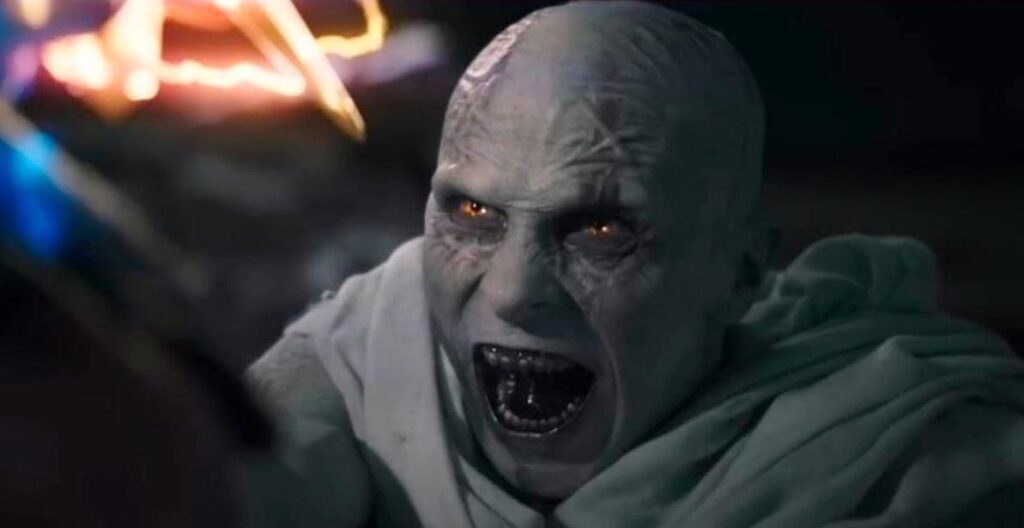
Alas, the actual combat between Gorr and our costumed heroes carries no such sense of danger. Waititi continues to enjoy setting fight scenes to pop music; having previously scored multiple sequences to Led Zeppelin in Ragnarok, he has now crawled a decade-and-change forward through the annals of classic rock and discovered the majesty of Guns N’ Roses. (Lest you think the needle drops here are subtle: When the characters alight on a city floating in paradise, the soundtrack blasts “Paradise City.”) I’m all for jazzing up action, but the guitars of “November Rain” can’t hope to salvage Love and Thunder’s set pieces, which blare with bright lights and hectic sounds but are hopelessly lacking in weight or momentum. The invincibility of superheroes has long hobbled directors who struggle to infuse their impossible abilities with physical realism, and while Waititi partially rose to that challenge in Ragnarok, here he is thoroughly defeated; the many scenes of computer-assisted mayhem are all haphazard, intangible, and dull.
Yet this failing doesn’t cripple Love and Thunder, which at its heart isn’t an action movie or a soaring romance but a quirky comedy. When they aren’t frantically hurling bolts of lightning, the characters are fun to be around, and the actors slip into a relaxed rhythm that belies the strenuousness of the superhero enterprise. (Speaking of actors, the low-budget troupe from Ragnarok makes a happy reemergence, with Melissa McCarthy now joining the troika of Sam Neill, Luke Hemsworth, and Matt Damon; the latter earns an enormous laugh when he sprays himself with mist in order to manufacture tears.) The movie’s best and most memorable sequence is a visit to Omnipotence City, a garishly appointed temple where countless gods roam and frolic and exhibit no interest whatsoever in helping humans. It’s lorded over by Zeus, played by a very funny Russell Crowe as a preening and overweight snoot outfitted with a bronze breastplate and swishing white miniskirt. The scene bustles with plot—the heroes are desperate for immortal assistance, and maybe they could use that fancy artifact over there as a weapon, and there’s something about a key to a mythical place called Eternity, blah blah—but it’s more notable for its giddiness and absurdity. It punctures the self-seriousness of the comic-book genre without openly mocking it.
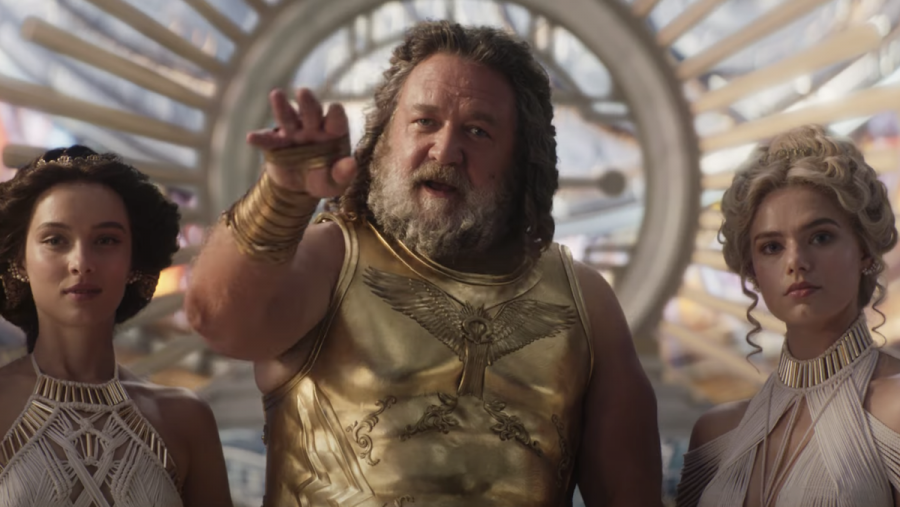
That’s a tricky needle to thread, and Thor: Love and Thunder doesn’t always master the balance; Korg may rarely change his benign expression, but when Zeus admonishes Thor, “You’re not invited to the orgy,” it’s easy to imagine the smug grin on Waititi’s face. Still, even if the execution is uneven, the intent is pure; there’s something weirdly honorable about a superhero picture where an alien takes meeting minutes, or where gods keep score about how many human sacrifices they’ve inspired in their name. This sloppy, goofy, pleasant movie is by no means worth worshipping. Yet its insignificance feels in some ways like an answered prayer.
Grade: B-
Jeremy Beck is the editor-in-chief of MovieManifesto. He watches more movies and television than he probably should.
